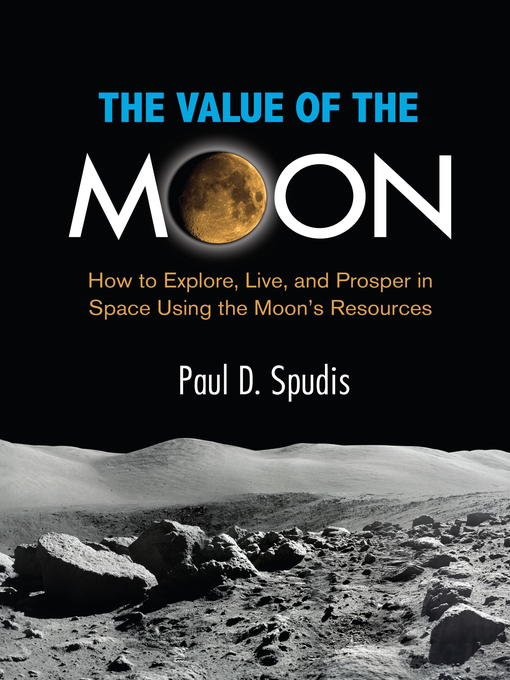
The Value of the Moon
How to Explore, Live, and Prosper in Space Using the Moon's Resources
کتاب های مرتبط
- اطلاعات
- نقد و بررسی
- دیدگاه کاربران
نقد و بررسی

February 1, 2016
Renowned geologist and lunar scientist Spudis (Blogging the Moon, 2011, etc.) makes a compelling argument that the moon's many available resources may jump-start mankind's pursuit of space travel. In the late 2000s, the news that the moon holds millions, possibly billions, of tons of ice at each pole stunned and excited the space science community. Ice is invaluable for two major reasons: it can be melted into liquid water, and its constituent parts (hydrogen and oxygen) can be harnessed and converted to rocket fuel. Additionally, lunar probes show that small areas near each pole are illuminated by the sun for most of the year, making them ideal locations for solar arrays to generate usable energy. The author writes that the lunar "resource bonanza" is tantalizing to those who hope to send humans back to the moon and beyond, as it eliminates the need for such resources to be hauled in from Earth. In approachable if at times technical prose, Spudis argues that the moon has everything we need to build a permanent moon base and that doing so can lay the foundation of a space transportation network. In fact, he argues that a manned trip to Mars may only be feasible if we establish a launch pad on the moon. To contextualize such an endeavor, this book is packed with historical, political, and cultural history about mankind's on-again, off-again relationship with the moon, a saga in which the author has been intimately entwined. Spudis also provides a literal road map to settling on the moon that is tremendously exciting to ponder. The author's deep knowledge and contagious optimism--even in the face of considerable government bureaucracy--make for fascinating reading that, happily, is not science fiction. A readable book sure to charm and thrill anyone interested in space exploration.
COPYRIGHT(2016) Kirkus Reviews, ALL RIGHTS RESERVED.

April 1, 2016
Scientist Spudis (Lunar & Planetary Inst.) elaborates on the lunar travel rationales and exploratory programs he proposed in The Once and Future Moon. In this less genial, often repetitive title, the author also warns that control of cislunar space (between Earth and the Moon's orbit) is economically and militarily strategic in the satellite era, and that only the United States can ensure fair, transparent, regulated development of lunar resources. Continuing a theme from his previous work, Spudis devotes much of a chapter to unfavorable analysis of NASA's focus on human travel to Mars and its loss of interest in lunar missions. In keeping with the more scholarly nature of this account, Spudis updated and edited his annotated "Lunar (formerly "Lunatic's") Library" of recommended resources and provides notes (sometimes as unnecessarily shortened URLs). VERDICT More technical and explicitly right-wing than its predecessor, this book will be a solid choice for space enthusiasts and science/technology policy wonks. For general readers and a more NASA-friendly title, albeit an outdated one, consider Michael W. Carroll's The Seventh Landing: Going Back to the Moon, This Time To Stay.--Nancy R. Curtis, Univ. of Maine Lib., Orono
Copyright 2016 Library Journal, LLC Used with permission.

April 1, 2016
Since Spudis' prior popular work, The Once and Future Moon (1996), there has been a startling discovery: Earth's closest celestial neighbor has water. Involved in the research into this revelation, Spudis summarizes the evidence as a prelude to this book's main argument: that the objective of America's human spaceflight program should be a permanent presence on the moon. NASA is intent, instead, on reaching an asteroid or Mars. Criticizing those destinations for scientific and technical reasons, Spudis also asserts that NASA will never receive enough money for these destinations. Thus, space policy ought to refocus on the moon because, in Spudis' repeated, slogan-like phrase, it's close, it's interesting, and it's useful. Presenting a methodical plan to establish a base, Spudis insists his ideas are within NASA's budget. If frugality doesn't convince them, Spudis suggests a strategic competition, noting that there is a new race to the moon with just one contestant: China. Realistic in its attention to political constraints, Spudis' lucid argument will persuade space enthusiasts that a return to the moon is the right direction for America's space program.(Reprinted with permission of Booklist, copyright 2016, American Library Association.)

























دیدگاه کاربران